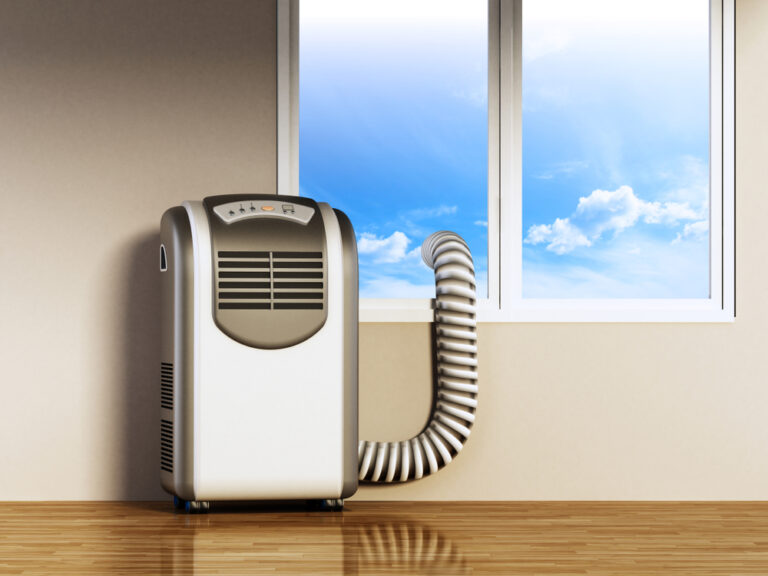Do you have a hard time keeping your home cool during the sweltering summer months?
Not everyone in Edmonton is able or ready to run out and buy a mini-split air conditioning system. People who rent, or live in smaller spaces, typically do not have a need for larger AC systems.
However, portable air conditioners are becoming more and more popular as people seek an easy and efficient way of cooling their home.
They are convenient, versatile and energy-efficient.
Here are some more benefits of owning a portable air conditioning unit:
The Benefits of a Portable Air Conditioning Units
When it comes to choosing the right air conditioning system for your home, you may want to consider installing a portable air conditioner.
Here are some significant benefits to owning a portable air conditioner:
- Easy Installation. In fact, there’s virtually no installation! Simply choose an exit, such as a window, for the exhaust hose and pop it into place.
- Portable and Convenient. It’s right there in the name! Portable AC units are designed with built-in castors, so you can roll it around from room to room.
- Low Cost. Portable air conditioners are affordable as well as energy efficient. They require less operational costs and allow you to focus on cooling specific areas of your home instead of the entire space.
- Dehumidifies. As a portable AC unit cools, it also works as a dehumidifier. This is great for those who suffer from allergies or live in a high-humidity space.
As with any cooling system you have in your home, there are proper ways of operating it and things you should avoid when using it.
Here are the do’s and don’ts of portable air conditioner units:
The Do’s
Determine the Correct BTU Size
Before you purchase a portable air conditioning unit, you need to ensure you are purchasing the proper size unit for the space you will use it in.
Trying to save money by buying a less expensive and smaller unit, then using it in a large space, is not going to provide adequate cooling and wear down the unit faster.
To determine the required BTU (British Thermal Units), calculate the room size in feet. For example, a 20 x 30 foot room will require a unit with at least 14 000 BTUs.
Properly Place the Exhaust Hose
The exhaust house needs to be directed to an area outside of your home. This way, the carbon dioxide – not to be confused with carbon monoxide – can be safely vented from your home.
Otherwise, the warm air expelled from the unit will accumulate in the room, making having an air conditioner in the first place absolutely pointless.
While it’s not particularly a health issue, having all the heat and humidity build up in your home can aggravate breathing issues such as asthma and allergies.
If you plan on using the unit in an area without a window, you can vent the unit through a door, a wall, the ceiling or the dryer vent.
Just keep in mind that venting a portable AC unit without a window will require some handiwork.
Invest in Good Filters
Most portable air conditioners come with a washable filter but, unless it is properly maintained, it’s not going to do you much good.
You can instead invest in a good filter, especially one with a carbon filter. These will remove odors from the air as well as boost air quality and unit efficiency.
Just remember to check the filter at least once a month and change it when necessary.
Consult a Professional
Although portable AC units are easy to install, it’s always best to consult a professional.
They can offer on-site advice regarding the positioning of your unit and its exhaust hose.
Luckily, our expert team at Peak Hydronics know all about cooling systems. So if you are concerned about the location of your portable unit, or want to vent the system without using a window, feel free to get in touch.
The Don’ts
Ignore Maintenance
Although a portable air conditioning unit seems like a plug-and-play product, it’s important to read the instructional manual for information regarding maintenance.
Proper maintenance of your unit will ensure that it has a long and efficient life.
Otherwise, you run the risk of the unit either breaking down or requiring more energy to operate.
Use an Outlet That Can’t Handle the Power Load
Portable air conditioners are energy efficient, but they still require more energy to operate than smaller appliances.
Before you plug in and operate your new system, make sure it won’t overload the circuit that is powering it.
Avoid plugging in the unit with other electronics and check to see amps the unit requires. For instance, if the air conditioner requires 30 amps, but your breaker is only 20 amps, the unit is going to trip the circuit breaker.
Place Your Unit in a Sunny Spot
While it may seem counterintuitive to keep your portable AC unit away from sunny and warm rooms, the heat of the sun can cause your unit to overwork.
An overworked unit will lead to a shorter lifespan.
So while you can certainly place the unit in a warm room, just try to keep the unit itself out of direct sunlight.
Beat the Summer Heat
Have more questions about keeping your Edmonton home nice and cool? Contact our team of HVAC and cooling experts today!

